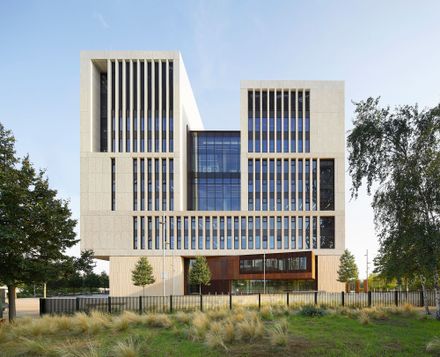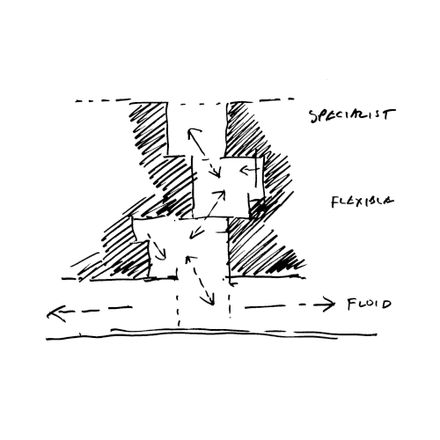
Marshgate UCL East Building
DELIVERY ARCHITECT
Sheppard Robson
DESIGN MANAGER
Plan A
BUILDING ACCESS + MAINTENANCE CONSULTANT
Reef Associates
STRUCTURAL DESIGN
AKT II
MEP, INFRASTRUCTURE, LIGHTING, ACOUSTICS, LOGISTICS, VERTICAL TRANSPORTATION, TRANSPORT, BIM, SECURITY, SUSTAINABILITY
Arup
INTERIOR ARCHITECTS
Stanton Williams, Sheppard Robson
COST CONSULTANT
AECOM
ACCESSIBILITY
All Clear Designs Ltd, Arup Group
CATERING
Tricon
PRINCIPAL DESIGNER ADVISOR
Bureau Veritas
PROJECT MANAGER
WSP Norge, WSP, Turner and Townsend
PUBLIC CONSULTATION
Soundings
LANDSCAPE DESGIN
Vogt Landscape
MAIN CONTRACTOR
Mace ltd
LOCATION
United Kingdom
CATEGORY
Educational Architecture, University
Marshgate, a 35,000 sqm state-of-the-art academic building designed by Stanton Williams, has been completed at the forefront of the UCL East campus, in London’s Queen Elizabeth Olympic Park.
Marshgate is designed to create a collaborative and cross-disciplinary educational environment focused on finding solutions to today’s biggest social, environmental, and technological challenges, drawing on the shared knowledge and expertise of the many faculties that will converge at the new East London campus.
The landmark scheme, UCL’s largest single building, offers eight floors of open and adaptable teaching, research, and collaboration spaces, for fields ranging from the creative industries to engineering, robotics, green technologies, and global health - inviting new and interconnected modes of working, and entirely new research avenues and disciplines to emerge.
Setting the standard for a new type of university campus, the building is designed to break down siloes and promote and cross-disciplinary learning, thinking, and research, bringing together students, academics, and the public.
Different floors are clustered into a series of ‘neighborhoods’, each with its own double-height collaboration space for informal meetings or exhibitions.
The lower levels of the building include a network of publicly accessible spaces, with a café, public art displays, and activities designed to draw schools, community organizations, and the public into the life and heart of the building interface with both the and wider Queen Elizabeth Olympic Park.
While public amenities predominantly populate the ground level, student, academic, and research spaces are concentrated on the central floors, and highly specialized laboratories and workshops are primarily situated on the building’s upper levels.
This configuration emerged from the end-user briefing carried out by Stanton Williams to the end of RIBA Stage 3, with further end-user briefing sessions carried out by joint interior architect Sheppard Robson in the subsequent stages.
Sheppard Robson built on Stanton Williams’ design to configure internal spaces to meet the University’s requirements, including lending specialist experience in designing laboratories, workshops, and a range of workspaces.
A central, day-lit atrium vertically connects all the building’s activities, and highly visible circulation routes including stairs and escalators create further opportunities for chance encounters and interaction.
Additional facilities include fabrication workshops, media studios, exhibition areas, design studios, lecture theatres, a library, and an executive suite and spaces for collaboration and engagement with local businesses and communities.
In a departure from the trend towards glassy, lightweight curtain wall facades, Marshgate is built to echo the solidity and permanence of UCL’s original Bloomsbury campus.
The massing also speaks to the site’s industrial past, referencing the buildings that historically populated the surrounding Lea Valley, while responding to the bold sculptural forms of the contemporary neighboring Olympic structures.
Comprised of in-situ and precast concrete panels in subtly graded tones and textures, the façade features timber board marked concrete on the lower floors and upper levels sculpted to optimize natural daylight and ventilation.
Reflecting UCL’s overarching mission to embed sustainability through its campus and culture, durability and energy efficiency were at the front of Stanton Williams’ design approach.
The BREEAM Excellent-rated building marries a strong and enduring identity with a highly flexible and long-life design approach to space and programming, and the solidity of the facade delivers high thermal performance and solar shading.
Passive design strategies informed the overall building design and the all-electric building is powered in part by renewable electricity, with the aim to reach net zero carbon by 2035 in keeping with the district’s wider sustainable energy strategy.
Together with the recently completed One Pool Street building, designed by Lifschutz Davidson Sandilands, which comprises both academic spaces and student accommodation, Marshgate marks the completion of the first phase of the UCL East campus masterplan, UCL’s biggest expansion in its 200-year history.
It also marks a major milestone in the wider creation of East Bank, a new cultural quarter for innovation, creativity, and learning supported by the Mayor of London, which will include UAL’s London College of Fashion, a new Sadler’s Wells East theatre, and new bases for BBC Music and V&A East.
Marshgate is also situated within Stratford’s SHIFT innovation district, a highly collaborative initiative headed up by UCL and other major bodies to bring together the public and private sectors with education, local communities, innovative enterprises, and tech companies to find, test, and demonstrate interventions to make cities safer, healthier and more sustainable.









































